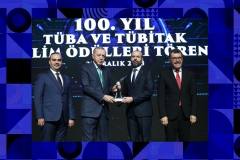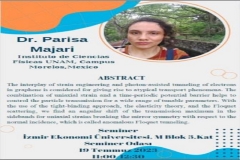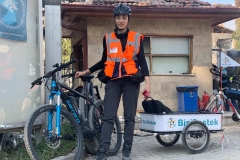
FACULTY OF ARTS AND SCIENCES
Department of Physics
GEHU 216 | Course Introduction and Application Information
| Course Name |
History of Civilizations II
|
|
Code
|
Semester
|
Theory
(hour/week) |
Application/Lab
(hour/week) |
Local Credits
|
ECTS
|
|
GEHU 216
|
Fall/Spring
|
3
|
0
|
3
|
6
|
| Prerequisites |
None
|
|||||
| Course Language |
English
|
|||||
| Course Type |
Service Course
|
|||||
| Course Level |
First Cycle
|
|||||
| Mode of Delivery | - | |||||
| Teaching Methods and Techniques of the Course | DiscussionQ&A | |||||
| Course Coordinator | - | |||||
| Course Lecturer(s) | ||||||
| Assistant(s) | - | |||||
| Course Objectives | The basic purpose of this course is to acquaint students with the basic evolutionary developments in the History of Western Civilizations and to enable them to analyze these developments, through a comparative perspective, in the economic, sociopolitical, cultural and scientific field for understanding the dynamics of the modern world. |
| Learning Outcomes |
The students who succeeded in this course;
|
| Course Description | The content of the course Hum 101 starts with the Prehistoric Ages and deals with the first civilizations, Ancient Greek and Roman cultural and political developments, the Byzantine Empire and the basic important developments in Europe during the Medieval Age. |
|
|
Core Courses | |
| Major Area Courses | ||
| Supportive Courses | ||
| Media and Management Skills Courses | ||
| Transferable Skill Courses |
WEEKLY SUBJECTS AND RELATED PREPARATION STUDIES
| Week | Subjects | Related Preparation |
| 1 | Introduction of the course: discussion on the basic historical terminology | Robert E. Lerner, et al., Western Civilizaitons, Their History and Their Culture, London, 1998. |
| 2 | The collapse of the Roman Empire in the West and the formation of the new political map of Europe | Robert E. Lerner, et al., Western Civilizaitons, Their History and Their Culture, London, 1998. |
| 3 | The Early Middle Ages (600-1050): Western Christian Civilization in the Early Middle Ages (ca. 600-ca. 1050) | Robert E. Lerner, et al., Western Civilizaitons, Their History and Their Culture, London, 1998. |
| 4 | The High Middle Ages (1050- 1300) I : Economic and Political Developments: Feudalism amd the Rise of National Monarchies | Robert E. Lerner, et al., Western Civilizaitons, Their History and Their Culture, London, 1998. |
| 5 | The High Middle Ages (1050-1300) II : Religious and Intellectual Developments: Papal Monarchy, Scholasticism; Learning and Art: Growth of Lay Education and Literature | Robert E. Lerner, et al., Western Civilizaitons, Their History and Their Culture, London, 1998. |
| 6 | Midterm Exam I | Europe as the Modern Civilization: Social, Economic and Political Life. |
| 7 | The Later Middle Ages (1300-1500) : Economic and Political Developments: Depression and Recovery; Thought and Literature: Nominalism and Naturalism; Technology: the Invention pf Printing | Robert E. Lerner, et al., Western Civilizaitons, Their History and Their Culture, London, 1998. |
| 8 | The Civilization of Renaissance (ca. 1350- 1550): Humanism; Reformation: Lutheranism, Protestantism and Catholicism; Foundations of modern science | Robert E. Lerner, et al., Western Civilizaitons, Their History and Their Culture, London, 1998. |
| 9 | Oversea Discoveries and Its Consequences Early Modern Europe (ca.1560-ca.1660) I: Economy: The Medieval origins of mercantilism and capitalism, and the commerical revolution; Society: Nobility, Peasantry and Bourgeoisie | Robert E. Lerner, et al., Western Civilizaitons, Their History and Their Culture, London, 1998. |
| 10 | The Age of Absolutism in Europe (1660-1789): the emergence of a state system; Scientific Revolution and Enlightenment: The world of the philosophes | Robert E. Lerner, et al., Western Civilizaitons, Their History and Their Culture, London, 1998. |
| 11 | Midterm Exam II | Robert E. Lerner, et al., Western Civilizaitons, Their History and Their Culture, London, 1998. |
| 12 | The French Revolution (1789) and Its Consequences | Europe as the Modern Civilization: Social, Economic and Political Life. |
| 13 | The Industrial Revolution and Its Consequences: Urbanization and Class Consciousness (1800-1850) Imperialism and its Consequences | Robert E. Lerner, et al., Western Civilizaitons, Their History and Their Culture, London, 1998. |
| 14 | The 19th and 20th Century Revolutions Ideologies: Liberalism, Nationalism, Socialism, Communism and Fascism | Europe as the Modern Civilization: Social, Economic and Political Life. |
| 15 | Europe as the Modern Civilization: Social, Economic and Political Life. | Europe as the Modern Civilization: Social, Economic and Political Life. |
| 16 | Final Exam |
| Course Notes/Textbooks | Robert E. Lerner, et al., Western Civilizations, Their History and Their Culture, London, 1998. |
| Suggested Readings/Materials | M. Kishlansky, P. Geary, P. O’Brien. Civilization in the West, 6th ed. New York: Pearson Inc., 2006. Server Tanilli, Uygarlık Tarihi, İstanbul, 2006. |
EVALUATION SYSTEM
| Semester Activities | Number | Weigthing |
| Participation | ||
| Laboratory / Application | ||
| Field Work | ||
| Quizzes / Studio Critiques | ||
| Portfolio | ||
| Homework / Assignments | ||
| Presentation / Jury | ||
| Project | ||
| Seminar / Workshop | ||
| Oral Exams | ||
| Midterm |
2
|
60
|
| Final Exam |
1
|
40
|
| Total |
| Weighting of Semester Activities on the Final Grade |
2
|
60
|
| Weighting of End-of-Semester Activities on the Final Grade |
1
|
40
|
| Total |
ECTS / WORKLOAD TABLE
| Semester Activities | Number | Duration (Hours) | Workload |
|---|---|---|---|
| Theoretical Course Hours (Including exam week: 16 x total hours) |
16
|
3
|
48
|
| Laboratory / Application Hours (Including exam week: '.16.' x total hours) |
16
|
0
|
|
| Study Hours Out of Class |
16
|
4
|
64
|
| Field Work |
0
|
||
| Quizzes / Studio Critiques |
0
|
||
| Portfolio |
0
|
||
| Homework / Assignments |
0
|
||
| Presentation / Jury |
0
|
||
| Project |
0
|
||
| Seminar / Workshop |
0
|
||
| Oral Exam |
0
|
||
| Midterms |
2
|
19
|
38
|
| Final Exam |
1
|
30
|
30
|
| Total |
180
|
COURSE LEARNING OUTCOMES AND PROGRAM QUALIFICATIONS RELATIONSHIP
|
#
|
Program Competencies/Outcomes |
* Contribution Level
|
||||
|
1
|
2
|
3
|
4
|
5
|
||
| 1 | To be able master and use fundamental phenomenological and applied physical laws and applications, |
|||||
| 2 | To be able to identify the problems, analyze them and produce solutions based on scientific method, |
|||||
| 3 | To be able to collect necessary knowledge, able to model and self-improve in almost any area where physics is applicable and able to criticize and reestablish his/her developed models and solutions, |
|||||
| 4 | To be able to communicate his/her theoretical and technical knowledge both in detail to the experts and in a simple and understandable manner to the non-experts comfortably, |
|||||
| 5 | To be familiar with software used in area of physics extensively and able to actively use at least one of the advanced level programs in European Computer Usage License, |
|||||
| 6 | To be able to develop and apply projects in accordance with sensitivities of society and behave according to societies, scientific and ethical values in every stage of the project that he/she is part in, |
|||||
| 7 | To be able to evaluate every all stages effectively bestowed with universal knowledge and consciousness and has the necessary consciousness in the subject of quality governance, |
|||||
| 8 | To be able to master abstract ideas, to be able to connect with concreate events and carry out solutions, devising experiments and collecting data, to be able to analyze and comment the results, |
|||||
| 9 | To be able to refresh his/her gained knowledge and capabilities lifelong, have the consciousness to learn in his/her whole life, |
|||||
| 10 | To be able to conduct a study both solo and in a group, to be effective actively in every all stages of independent study, join in decision making stage, able to plan and conduct using time effectively. |
|||||
| 11 | To be able to collect data in the areas of Physics and communicate with colleagues in a foreign language ("European Language Portfolio Global Scale", Level B1). |
|||||
| 12 | To be able to speak a second foreign at a medium level of fluency efficiently |
|||||
| 13 | To be able to relate the knowledge accumulated throughout the human history to their field of expertise. |
|||||
*1 Lowest, 2 Low, 3 Average, 4 High, 5 Highest
NEWS |ALL NEWS

The Physics Department Erasmus Agreement
Dear Students of the Physics Department at Izmir University of Economics, Our university has signed an Erasmus agreement with University Paul Sabatier Toulouse

Four major awards in 5 years
Prof. Dr. Göktuğ Karpat, Faculty Member at Department of Physics, Faculty of Arts and Science, Izmir University of Economics (IUE) has been

The Physics Department Erasmus Agreement
Dear Students of the Physics Department at Izmir University of Economics, We are pleased to share with you an exciting announcement! Our university

Loved physics, gave up her childhood dream
Senem Özdemir, who has been dreaming of becoming a pilot since childhood, graduated as the top student in the Department of Physics

Scientific visit to the Department of Physics
Dr. Parisa Majari came to visit our Physics Department. Dr. Majari who studied with Prof. Dr. Gürsoy Bozkurt Akgüç gave a seminar

Ambassador of 'goodness'
Berfin Kolcu, a student of Izmir University of Economics (IUE) Department of Physics, went to Hatay, where thousands of people were under

our student physics project at the finals
NEBULA rocket team, a branch of physics club established by our students is now at the finals after succesfully passing critical design


